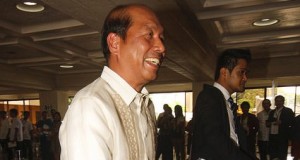MANILA, Philippines – Budget Secretary Florencio Abad Tuesday claimed that the errata for the 2015 national budget was “principally” for typographical errors and other changes he described as “not substantive.”
“The errata is really principally for typographical errors. In the course of preparing the budget there are spelling errors or the figures are missing,” Abad told reporters in an ambush interview after the Senate budget hearing.
“We do this regularly, especially before the period of amendments to just correct mistakes in the budget,” Abad said. “They’re not substantive.”
“You cannot avoid making these errors during inputing of data, printing of material or aligning text and numbers. The insinuation that ‘insertions’ are being introduced is purely speculation,” Abad said in a separate text message to reporters.
Alliance of Concerned Teachers party-list Representative Antonio Tinio first blew the whistle on the supposed errata report, claiming that it was submitted just after the budget bill was passed on second reading.
Tinio said the late submission was meant to skirt Congress’ debate on the errata, and that it may contain substantial errors like redefining savings and reprioritization of programs meant to turn the budget into the president’s pork barrel.
The errata report was purportedly railroaded to go around he Supreme Court decision prohibiting the practice of using savings in the middle of the year contained in its decision on Aquino’s economic stimulus package Disbursement Acceleration Program (DAP).
But Abad said they haven’t submitted the report yet, adding that they plan to submit it within the week.
He said no substantive amendments were made, adding that redefining savings was already inserted in the National Expenditure Program (NEP)
“The redefinition of savings and related issues were already in the NEP that was debated upon and approved on second reading,” Abad said.
Abad added that the report was only thick because of the various corrections in the budget of state universities and colleges.
“All we are introducing are corrections to errors,” he said.
Eastern Samar Representative Ben Evardone said no rules were violated in the submission of the errors so long as a representative will sponsor and adopt the errata report.
A small committee was formed to tackle the individual amendments, the deadline of submission set on October 1, Evardone said.
He added that the submission of errors is a usual practice in the budgetary process. He clarified, however, that he has yet to see the report.
“Ang lusot diyan, i-adopt na ang set of amendments submitted by Malaca_nang. ‘Yun ang way out (The way out there is, the amendments submitted by Malacanang will be adopted),” Evardone said.
The Aquino ally also said the purported midnight insertions only became an issue because of the court’s decision on DAP.
‘Yung past budgetary processes, ganun ang practice eh. Naha-highlight lang dahil masyadong controversial ‘yung isyu ng budgetary practice dahil sa SC decision on DAP and savings (It was the usual practice in the past budgetary process. It only became an issue because of the SC decision on DAP and savings), ” Evardone said.
Bayan Muna Representative Neri Colmenares said Monday that they were opposing DBM’s errata saying that they have not yet read these and that the entire budget should undergo deliberations again if any changes would be made.
“The DBM has admitted that there are errata in the budget we passed. We’re going to demand that the moment they insert the errata, [the budget] must be subjected to deliberations again. We didn’t see these errata, so we approved the wrong budget. It’s as good as if the second reading did not take place” Colmenares said.
Abad said that some of the changes in the errata were in the adjustments of performance indicators and reallocation of funds due to events that happened after the budget was prepared.
He said that some agencies or departments that got additional funds, were deducted funds, or were given additional responsibilities, and then their performance indicators were adjusted as well.
“The other one is reallocation. In the computation of the number of poor people, in DSWD for example, poverty went down by three percent which means 2.5 million people were out of the poverty segment. We have to consider that and adjust the number of poor people that they will serve in the coming years,” Abad said.
“Some are funds were not necessary and therefore we had to make some reallocation. For example we reallocated for APEC preparation. There is really nothing substantial,” he said.
Originally posted: 4:25 pm | Tuesday, September 30th, 2014
RELATED STORIES
Solon decries ‘midnight insertions’ in 2015 budget
Errors mar passage of 2015 budget in House
RELATED VIDEOS



